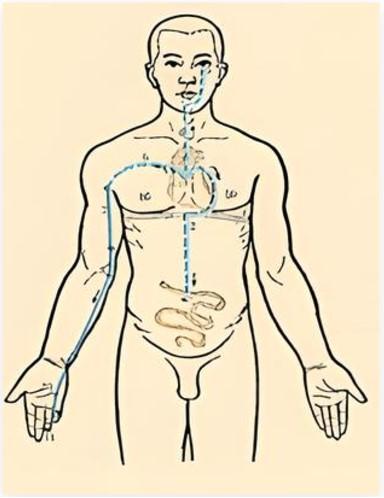Below are common disharmonies of the heart and small intestines:
Deficiency of heart qi
Palpitations or fearful throbbing, and
breath shortness that are worse on exertion. Others include sweating, pale face, fatigue and general weakness. On examination, a pale tongue with white coating, and the pulse is thready and weak.
Reference to Western medicine: Heart diseases or heart failure.
Deficiency of heart yang
Palpitations or fearful throbbing, dull pain in the cardiac region, shortness of breath, these symptoms can be worse on exertion. Others include fullness in the chest, dull pale face, sweating, fatigue, sensitive to cold temperatures and cold limbs. On examination, a bulky moist tongue with white coating, the pulse is thready or knotted and intermittent.
Reference to Western medicine: Heart diseases or heart failure.
Deficiency of heart blood
Dizziness, palpitations or fearful throbbing, a tendency to be frightened, insomnia, dream distrubed sleep, poor memory, lusterless or sallow complexion, pale lips and nails. On examination, the tongue is pale white, and the pulse is thready and weak.
Deficiency of heart yin
Palpitations, fearful throbbing, chest oppression, insomnia, poor memory, dream disturbed sleep, fever occurring at the same time of day or low grade fever, red cheeks, feverish sensation in palms and soles of the feet, night sweating, dry lips and throat. On examination, the tongue is red and dry without fur or with thin yellow fur, the pulse is thready and rapid.
Reference to Western medicine: Neurasthenia, and tuberculosis.
Heart fire blazing
Sores on the tongue and mouth, insomnia, palpitations, fearful throbbing, feverish sensation in the chest, irritability, red face, thirst with a preference for cold drinks, constipation, hot and yellow urine. On examination, there is a red tongue with a yellow coating, a rapid and forceful pulse. In severe cases, agitation, vomiting blood, nasal bleeding, difficulty urinating, bloody urine or skin sores may appear.
Reference to Western medicine: Stomatitis and neurasthenia.
Stasis of heart blood
Palpitations, fearful throbbing, pricking pain or stuffy pain in the cardiac region, which can radiate to the left shoulder and arm, cyanosis (blueness of lips and nails), darken complexion and cold limbs. On examination, there is a dark red tongue, or purplish tongue with petechiae (small bruised spots), a thready rugged pulse or knotted and intermittent pulse.
Reference to Western medicine: Coronary heart disease or angina.
Phlegm and fire agitating heart
Fever, heavy breathhing, irritability, dizziness, insomnia, red face and eyes, thirst, chest oppression, spitting yellow thick sputum and dark yellow urine. In severe cases, mental disorders or emotional instability appears. On examination, there is a red tongue with a yellow and sticky coating, and the pulse is rolling and rapid.
Reference to Western medicine: Schizophrenia.
Phlegm misting heart
Darken complexion, dull pain in the gastric region, nausea, low spirited, sleepiness or even stupor and drooling or gurgling in the throat. In severe cases, mental disorders or coma appears. On examination, there is a pale tongue with white greasy coating and a rolling pulse.
Reference to Western medicine: Stroke and high fever coma.
Deficient and cold of small intestine
Dull pain in lower abdomen which feels better when pressed, borborygmus (rumbling noises caused by the movement of gas in the intestines), diarrhea and urinary difficulty. On examination, the tongue coating is thin and white, and the pulse is slow.
Reference to Western medicine: Enteritis
Excess heat of small intestine
Irritability, sores in mouth or tongue, thirst, red face, scanty dark yellow urine, pain on urination, urinary urgency, bloody urine and distending pain in the center of the abdomen. On examination, the tongue is red with a yellow coating, and the pulse is rapid.
Reference to Western medicine: Urinary infection.
Qi stagnation of small intestine
Colic in the lower abdomen, abdominal distension, borborygmus (rumbling noises caused by the movement of gas in the intestines) which can be relieved by passing gas, or the presence of retracting pain in testicles. On examination, the tongue has a white coating, and the pulse is deep and taut, or deep and tense.
Reference to Western medicine: Hernia



